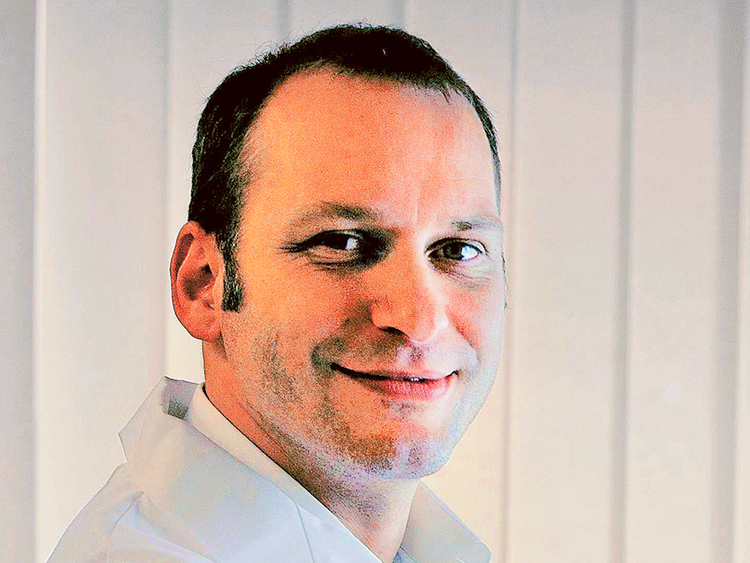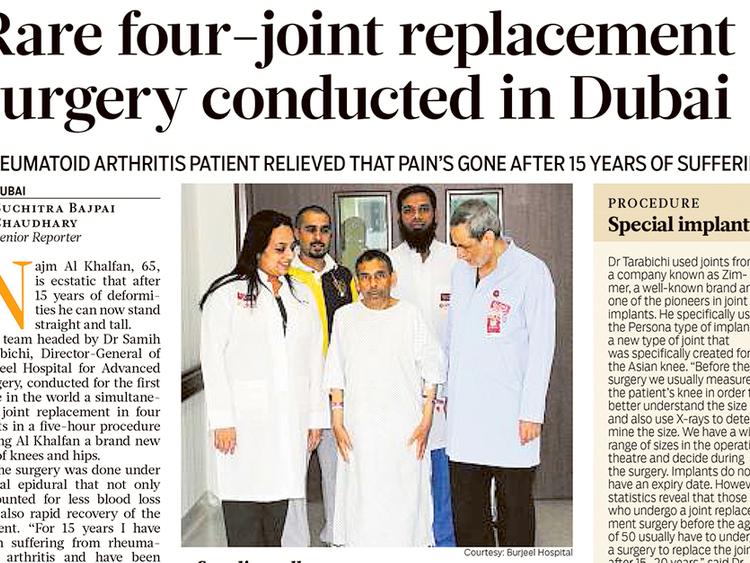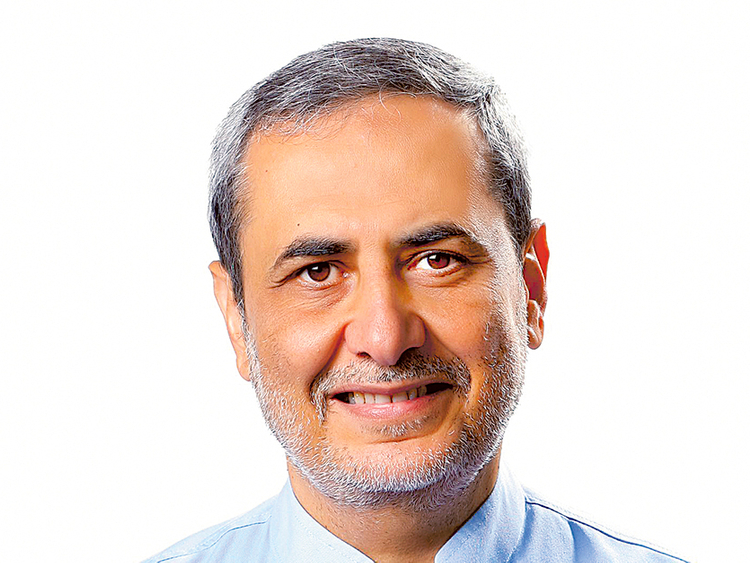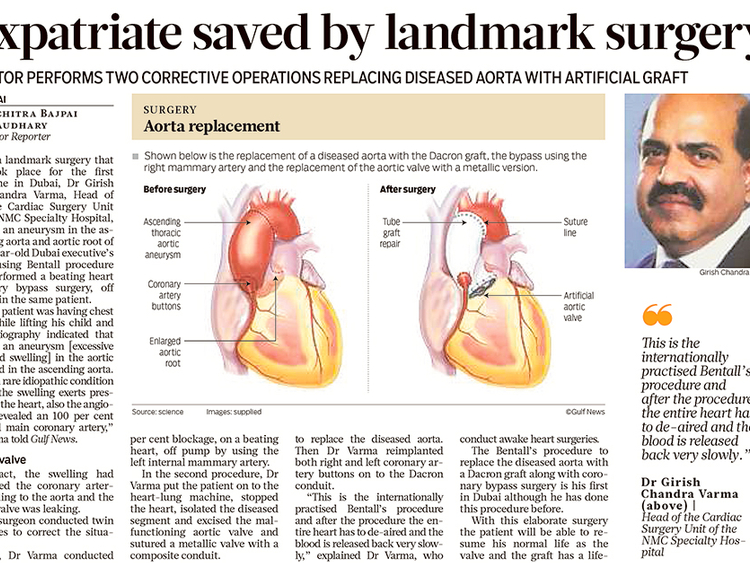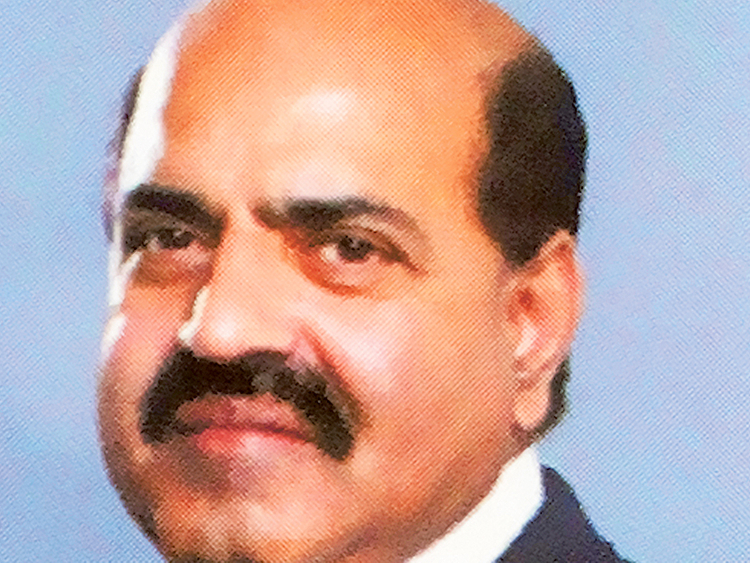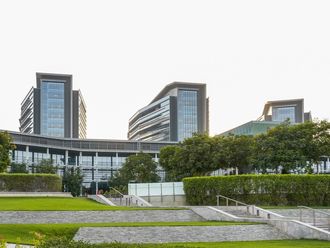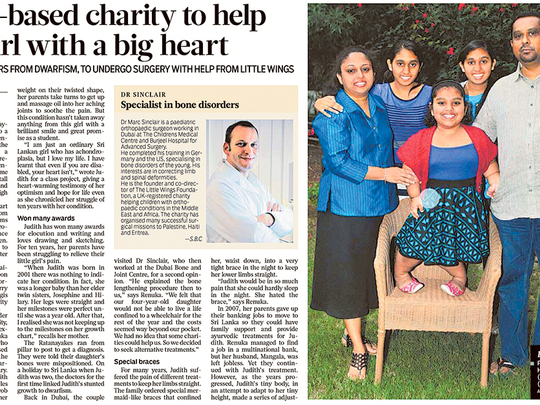
Dubai: As more and more internationally renowned health experts with intensive experience have begun working in the UAE, hospitals have been able to set up medical precedents. This augurs well for Dubai’s medical tourism initiative which projects up to 500,000 medical visitors by 2020, who will account for an annual medical spend of Dh2.6 billion.
In the last one year, surgeons in Dubai have conducted highly complex and challenging surgeries that include a four-joint replacement surgery simultaneously on the hip and knees; a beating heart coronary bypass combined with the reconstruction of the aorta with a dacron graft; removal of a large blood clot in the brain of a stroke patient through mechanical thrombectomy, and straightening of the S-shaped limbs of a 12-year-old patient suffering from achondroplasia or dwarfism.
All these cases were high-risk, had proven high-mortality rates and needed considerable expertise and team work to be successful. In some cases, the surgeries have been firsts in their domain.
Gulf News had reported on all these cases as they happened and we now revisit the patients and the respective health-care providers for an understanding of why these surgeries qualify to be counted among the rare achievements in the medical field.
What: Four-joint simultaneous replacement surgery for knee and hip joints.
- Patient: Najm Khalfan, 65.
- When: Conducted on January 6, 2015.
- Where: Burjeel Hospital for Advanced Surgeries, Dubai.
- Surgeon: Dr Samih Tarabichi, medical director and head of the Advanced Joint Surgery Centre.
- What makes it rare: While doctors around the world have conducted four-joint surgeries involving the knee and the ankle, so far, no medical literature in the world mentions the simultaneous replacement of the knee and hip joints.
“To conduct this surgery in under five hours with little blood loss in a 65-year-old patient, required considerable medical expertise and synergical team work,” said Dr Tarabichi. The patient, who had not been able to stand for the last six months and was walking with knees and hips flexed for the last 15 years owing to rheumatoid arthritis, was able to stand on the second day of the surgery, walked with assistance on the third day and after passive physio-therapy, is showing signs of giving up his walker.
Dr Tarabichi said: “Achieving such results not only reflects the perfect synergy of our team, but also goes to show that we are constantly challenging the system, contributing to the scientific community, upgrading it to be internationally competitive and contributing towards continuous medical education in the field.”
Dr Tarabichi has also presented five papers to the Journal of Arthoplasty that is the international almanac for arthoplasty.
What: Mechanical Thrombectomy.
- Patient: F.A., 50, from Saudi Arabia, visitor to Dubai who was wheeled into the emergency with no movement on the left side of her body and loss of speech.
- When: Conducted on January 20, 2015.
- Where: Rashid Hospital, Dubai
- Surgeon: Dr Sohail Al Rokn, head of Stroke Unit and his team.
- What makes it rare: While small clots can be dissolved with thrombolytic agents that act as decoagulants, the patient’s blood clot was very big. This surgery was rare as it is not available anywhere in the GCC region except at Rashid Hospital that offers it 24/7.
The surgery reversed the damage completely within 48 hours. The patient not only had her speech restored but was able to walk out of the hospital within less than a week of the surgery. She has flown back home with her family, but is in touch with the hospital.
“By providing such medical expertise in the region, we are also working towards collaborating with other health-care services in the region to train doctors and set up similar stroke units in the GCC countries. This also ties in with the government’s medical tourism policy as Dubai is endeavouring to be the leader in the region,” Dr Al Rokn told Gulf News.
What: Bentall’s procedure.
(This is a process in which an aneurysm in the aorta of the heart is excised and the diseased aorta replaced by a dacron grant. Simultaneously, a beating heart coronary bypass, off pump, is also conducted).
- Patient: Shabbir Ahmad, 47, resident of Sharjah.
- When: First week of January, 2015.
- Where: NMC Specialty Hospital, Dubai.
- Surgeon: Dr Girish Chandra Varma, head, Cardiac Surgery Unit.
- What makes it rare: Dr Varma told Gulf News: “The twin procedure, done at the same time, is rare. Bentall’s procedure is done elsewehere but in Dubai, it was conducted for the first time. What made it special was combining it with the beating heart surgery for coronary bypass. While coronary bypass is common, very few doctors conduct it on a beating heart and off pump. Added to this was the fact that in this case I did a complete revascularisation, connecting different bypass grafts to the native coronary artery like connecting a network of sprinklers to the main tap. Earlier, doctors avoided complex surgeries as they did not want to take the risk. But I learnt this procedure at a University Hospital in Paris and have done it in India many times and, using my experience, I was able to do it for the first time in Dubai.”
Ahmad, who could not pick up even moderately heavy items without feeling a sharp pain in the region of his heart, has recovered and is ready to report back to work. “I have started walking and am eating healthy and so far have no complaints. I expect to get back to work soon,” he told Gulf News.
What: Illizarov technique
(Uses a special frame to straighten mishappen leg bones.)
- Patient: Judith Rattanayake, 12, who suffers from achondroplasia, a form of dwarfism.
- When: From February 4, 2014 to the present.
- Where: Medcare Hospital, Dubai.
- Surgeon: Dr Marc Sinclair
- What makes it rare: Dr Sinclair, who is conducting the ongoing surgical procedure that will eventually cost upward of Dh800,000 but is free of charge for Judith under the aegis of the UK-based charity Little Wings Foundation, told Gulf News: “The interesting aspect in Judith’s case is the severity of the deformity in her legs. The angulation was extreme and required many months of gradual correction with the risk of vascular and nerve injury present. In general, these surgeries are done in centres that specialise in limb deformities, which is one of my special interests and, as far as I know, there are no other centres in the UAE that like to take on these kinds of cases. I have many examples in which these patients are referred abroad by other centres.”
The series of surgeries on Judith will not only relieve her of her agonising pain but also add about 4cm in height to her 1-metre tall frame. So far, the surgery has been successful in one leg and, in an extended procedure that will last for another year, her second leg will be operated upon soon.
Renuka Rattanayake, Judith’s mother, told Gulf News: “It was such a relief to see Judith’s leg straightened out and although she has a lot of pain still, we are all hopeful that both her straightened limbs will help her be independent and rid her of the pain her distorted bones were causing.”
Talking about surgeons in Dubai and the UAE’s push for medical excellence, Dr Sinclair said: “While many doctors prefer to stay on the safe side and not endanger their career, there are always surgeons that do take the risk to engage in surgeries which do not always have a 100 per cent guaranteed outcome.”
Highlighting the need for higher standards paving the way for transparency in the field, Dr Sinclair added: “Medical professionalism, in my opinion, demands that the surgeon in charge highlight the procedure and all possible complications to allow no room for misunderstanding. To me, giving patients a realistic understanding of what might happen if they sign on the dotted line is an integral part of medical professionalism. Medical professionalism also means that the indication for surgery should only be considered if it is the superior approach to solve the patient’s problem. This should, if available, be backed by evidence found in current research literature. In terms of academic excellence, it remains important that in an increasingly competitive health-care system driven by private health-care providers, we stick to the procedures we are specialised in.”
What: Mesh hernioplasty.
- Patient: Victoria Odita, a morbidly obese Nigerian patient suffering from incisional hernia due to four Caesarian sections.
- When: March 2014.
- Where: Ras Al Khaimah Hospital.
- Surgeon: Surgeon: Dr Anoop Panigrahi, head, department for minimally invasive sureries.
- What makes it rare: Because it had a high risk of mortality. “The patient was obese and her heart was working only 25 per cent of its normal capacity so the chances of mortality were high,” said Dr Panigrahi. “Many hospitals had refused to conduct the surgery and it was important to save her life as she was in great pain and completely bedridden.”
The patient has returned to her country and is in touch with her surgeoen. “Victoria is doing really well and the success of this complicated surgery has generated her faith in us so much so that she is returning soon for another surgery. In the end, heath providers need to establish this kind of trust in their patients.”
Speaking to Gulf News from Nigeria, Victoria told Gulf News, “I was in great pain and completely bedridden prior to the surgery. Now I am able to attend to the demands of my children and family and am on my feet. The quality of my life changed and I am returning to the UAE for a sleeve gastric bypass surgery soon, to fix my obesity problem.”


